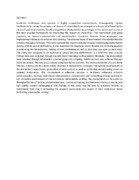| dc.description.abstract | Academic institutions now operate in highly competitive environments. Consequently, myriad mechanisms for rating the services and impact of universities have emerged as a means of influencing the choice of potential students, faculty and partners. Webometrics has emerged in the recent past as one of the most popular frameworks for measuring the impact of universities. This mechanism puts great emphasis on research productivity and dissemination. Academic libraries have developed and implemented strategies to enhance their ranking. The role and levels of involvement of academic libraries in these strategies is unclear. This study analysed the role of academic libraries in enhancing Webometrics ranking of their parent institutions. It also examined the degree to which libraries are currently involved in enhancing the Webometrics ranking of their institutions as well as how they can scale up their roles. This study was designed as an exploratory survey because webometrics is a relatively new concept. Primary data was collected through key informant interviews with academic librarians. The respondents were selected through information-oriented purposive sampling. Additional data was collected through literature review. The data was analysed using descriptive statistics. The study established that academic libraries in Kenya are, to a great extent, involved in webometrics strategies through the development of the institution’s repositories, generation of web content as well as publishing and providing access to updated e-resources. This involvement is effective because it facilitates enhanced scholarly communication, resolute institutional web presence, collaboration and networking among institutions, and ultimately endorsement of the institutions’ webometrics ranking. The involvement can be scaled up through effective ICT policies and infrastructure, continuous training, involvement in library consortia, and high quality content development. The findings of this study may be used by academic libraries to mainstream their role in enhancing the research productivity and impact of their institutions hence facilitating a favourable ranking. | en_US |
